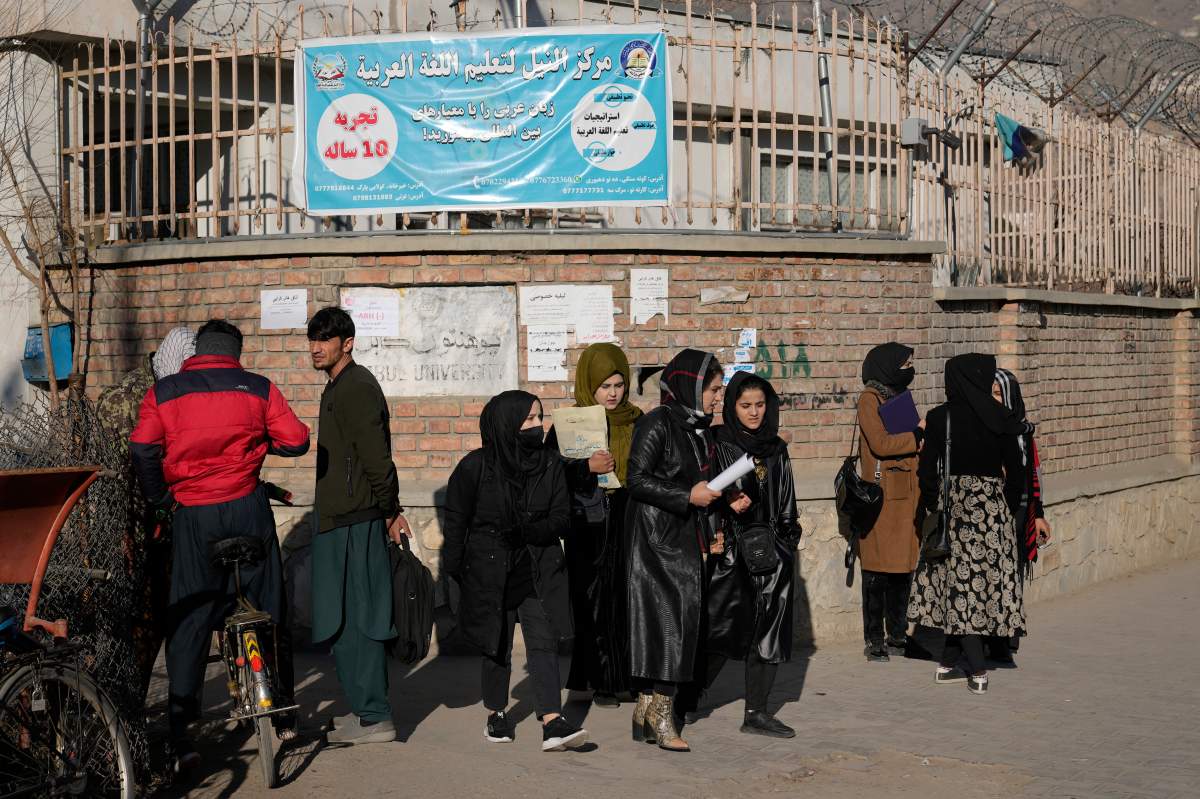With the Taliban coming to power in Afghanistan in August 2021, for the second time in a generation, women in that country are facing the systematic removal of their rights and their access to universities, schools, and work at NGOs.

Ahead of International Women’s Day on March 8, Global News spoke to women and people on the ground as the Taliban attack on women continues to escalate. In some cases, names have been changed to protect the safety of the individuals in this report. The Taliban has repeatedly hunted and killed critics.
But still, some are speaking out in the hope that Canadians will not forget them.
Faramarz is an alias for a woman who says she lives in a prison called Afghanistan. She was completing her law degree and was in her last semester of university — so close to her dream of graduating, but in a blink of an eye, that goal became so far away.
“I was at home and I was working on my research and I heard on the internet that girls are banned from going to university,” she said, referencing the Taliban decision in December 2022.

The edict came down while she was doing research for her thesis on Dec. 20, 2022. Faramarz decided to fight against the ideology of the Taliban by participating in protests — which put her life in danger.
“They said to us, ‘If you participate again in this program, we will kill you.’”
She did not give up and she is committed to standing up for her rights.
“Home is like jail for us and we will fight until we legalize our human basic rights without any discrimination. “

A few days after banning women and girls from university, the Taliban also banned girls and women from working at non-government organizations (NGOs).

Get daily National news
Shokria Etemadi, an engineer who had worked for an NGO, had to quit after the Taliban edict.
“Before the rules of the Taliban, I had a test for a new leadership position. I passed my exam, and after my exam, they invited me for in an online interview. Then I passed the interview,” she said.
“At the end of interview, they said to me, you cannot join us because of the rules and regulations of Taliban. And it’s so hard for me.”
Now she — and her family — are suffering from poverty.
“I am the breadwinner of my family. We are just four persons in my family: me, my sister and my parents. My father is sick now. We don’t have anything in our kitchen to prepare for dinner or for our night,” she said.
“It’s so hard for me. I don’t know how I can continue my life.”

The edicts of the Taliban are causing psychological problems, like depression for girls and women in Afghanistan.
Dr. Sharfuddin Azimi, a psychologist in Kabul, says more than 50 per cent of his clients are women who are facing challenges such as depression, obsessive-compulsive disorder and post-traumatic stress disorder.
“In some cases, the girls and women clients tell me that they don’t want to be alive; they want death. They say, ‘We don’t love life. Our life is not like humans, like women, in other countries’” Dr. Azimi said.
He said the situation is so dangerous, many women are choosing suicide or engaging in substance abuse, or they are desperately trying to leave Afghanistan.
Every week, a report on the suicide of women and girls is published by local media in Afghanistan, but the actual number of suicides is not known.
In the city of Zaranjin, in Nimroz province, a local report said a young girl hanged herself because of the ban on education for women. She was one of the thousands of girls and women who are facing challenges and suffering in Afghanistan.
NDP MP Heather McPherson has called on the government of Canada to bring Afghan women and girls to safety.
“There’s been a failure to prepare a humanitarian carve-out so that organizations — Canadian organizations that want to provide support in Afghanistan — can do so,” McPherson said.
She added: “I’m going to continue to push the government to do this important work. People’s lives are at risk. What I can say as well is that there are members of all parties that are pushing for this.”

Canadian Women for Afghan Women (CW4WAfghan) is one of the organizations trying to help Afghan girls through online educational programs.
“We have a number of different programs. We have different grades learning. We have professional courses as well for adults. So across all of them, there are hundreds enrolled in online education,” said Lauryn Oates, executive director of the group.
“(CW4WAfghan) and many other organizations advocate with the government of Canada to address the big problem of the student visa issue.”
Care Canada was one of the three NGOs that temporarily suspended operations in Afghanistan when the Taliban announced the ban on women working in NGOs last December.
And while there have been some changes, there is still enormous work left to do.
“There have been exemptions provided, one of which is for health programming and then more recently for primary education. So we have been able to restart some of our programs in those areas,” said Maxime Michel, director of global programs at Care Canada.
“And while there have been some changes, there is still enormous work left to do.”
As they do, Faramarz and thousands of other girls and women who suffer in Afghanistan look with an eye of hope to be supported by the international community and countries like Canada.
“Please support Afghan girls, Afghan women,” Faramarz said.
Etemadi bluntly described how it feels right now to be a woman in Afghanistan as the Taliban’s crackdowns continue: “The poorest women in the world, the saddest women in the world. Now we are alone.”








Comments
Want to discuss? Please read our Commenting Policy first.